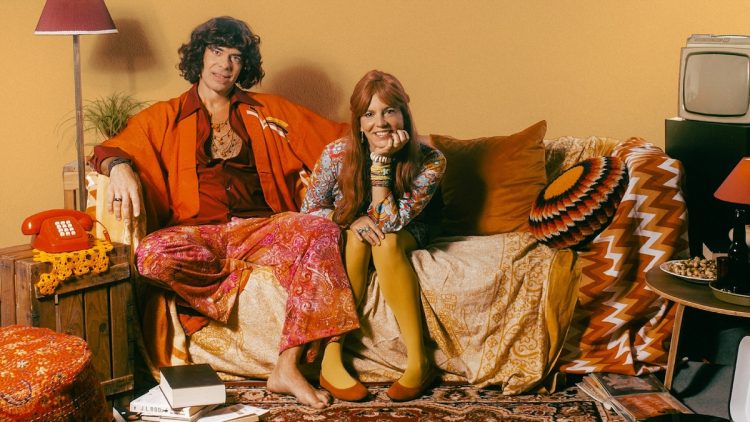
Constant shifts in perspective and playful music and visuals dynamise this Catalan production of English playwright Mike Bartlett’s Love, Love, Love (2010), translated by Cristina Genebat and directed by Julio Manrique. The title is taken from the famous Beatles’ track.
The time-leaping production begins in 1967. Kenneth (a self-consciously suave David Selvas) is a 19-year-old Oxford University student with a working-class background hanging out at the home of his older brother Henry (Marc Bosch). While Henry is stuffy and straight, Kenneth has gone full hippy, apparently enjoying the liberties that student life has to offer – books, records, weed and girls. When a self-expressive student at the same university called Sandra (a delightfully dangerous Laia Marull) shows up stoned, the incense intensifies. Forget Henry; Sandra and Kenneth get it on to Hendrix, and spontaneously pledge a life of adventure together.
Fast forward to 1990 and Ken and Sandra are now married with two teenage kids, Jamie (Marc Bosch) and Rose (Clara de Ramon). By now, the parents have coolly flipped into the neoliberal mindset, privatising everything for a fast profit. Meanwhile, the kids are already struggling: Jamie seems lost, until he gets the go ahead to loaf about for a lifetime. Rose needs to chill out, and is encouraged instead to dedicate herself to violin-playing despite its precariousness as a career. Then, Ken and Sandra make a spur of the moment decision: to chuck in the marriage and try something new. What’s to lose?
The third part is set in 2011. Ken and Sandra are in touch and getting along like a house on fire. The rewards of their booming businesses and pension schemes have made them individually healthy, wealthy and happy. Jamie, however, is entirely dependent on them. Rose finds herself approaching 40 with a curiously conservative array of expectations and what she calls, “nothing to show for her life.” She confronts her parents and accuses them of destroying her future…
Bartlett is a master at poking at white middle class arrogance and irresponsibility through manipulatively charming characters. Poor Rose is the petulant party pooper while her narcissistic parents Kenneth and Sandra cruise joyfully through life. The crushing context is made clear, though it too seems oddly seductive. In Manrique’s signature inter-scene montage archive images of the poll tax riots, the Royal drama, and grinning liar Tony Blair flicker by attractively, if not chronologically, to Pulp’s Britpop classic Do You Remember The First Time.
The play asks heavy questions that the production takes care to make conspicuous: To what extent can we blame our parents for how our lives turn out? And at what point have our lives ‘turned out’ at all? You can’t help but wonder about those 12 years since the play was written, those that take us from 2011 to 2023. Bartlett didn’t attempt to add another scene, of course (after the three used in the title, the “loves” run out). Instead he wrote other plays, such as Albion (2017), to explain how we got from Love Is All You Need to now.
Boomer-blaming is actually a thing. Baby boomers (born between 1945 and 1965) are often given the blame for Brexit as more apparently voted Leave than any other generational group. That means the same people that subsidised their lives with massive public borrowing, that enjoyed public utilities, salary pension schemes and free university education then set about abolishing and privatising, finally rejecting EU membership and limiting the possibilities for Britain’s youth and its future. Or, did they…? As in all Bartlett’s brilliant and deceptively-simple plays – it’s complicated.
Love, Love, Love is at La Villarroel in Barcelona until 3rd December.
The play is in Catalan.
For more awesome reviews see: www.recomana.cat
